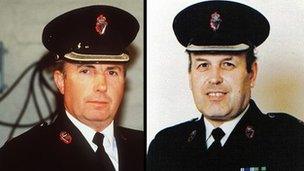Did truth ambitions pass the Smithwick inquiry test?
- Published
- comments

Harry Breen and Bob Buchanan were murdered by the IRA in 1989
So does the outcome of the Smithwick tribunal strengthen arguments for what Sinn Féin terms an independent international truth recovery process?
Or does it, as the Ulster Unionists argue, deliver the death knell to the credibility of any Truth Commission?
Such a Truth Commission did not specifically feature in the questions recently posed by Richard Haass to the negotiators in his inter-party talks process.
However, Dr Haass did ask the politicians if the existing bodies or processes dealing with the past, such as the Historical Enquiries Team, historic investigations by the Police Ombudsman, inquests and inquiries, might "be reformed, combined or otherwise improved?".
'Some credibility'
Should a combined body dealing with the past be agreed, it might not be called a Truth Commission but its goal would surely include uncovering further evidence about the darkest episodes of the Troubles.
The meeting that took place between three former IRA members and the Smithwick tribunal's legal team in April 2011 could be seen as a test run for any future Truth Commission.
The former IRA members refused to give evidence under cross examination to the tribunal but they did provide a written note detailing their version of the killings. They subsequently met the tribunal team to clarify various discrepancies in their account.
Essentially the IRA's version of the ambush was that, in the words of one of the former members who talked to the Smithwick team, "this was classic surveillance, hard dogged work, there was no help from anyone at all". The IRA members said they had kept an eye on the RUC officers' red Vauxhall Cavalier for months leading up to the murders.
As Gerry Adams has noted, justice Smithwick didn't dismiss the IRA's account out of hand. Instead he noted that "there is much to lend credibility to and corroborate elements" of the IRA's version of events. He also found it "plausible" that the IRA could have mounted an operation to ambush Bob Buchanan "on the basis of an established pattern of travel".
However the judge believed there were contradictions in the IRA's version of events. Although Peter Smithwick admits to having uncovered no "direct evidence" of collusion, his detailed analysis of the timing of the operation and his belief that Chief Supt Harry Breen was the IRA's specific target led him to decide that, on the balance of probabilities, someone in the Garda Síochána tipped off the IRA and betrayed the two RUC officers.
Distrust
The copious report is much more than "tittle tattle" - to quote Gerry Adams - but still falls far short of pointing a finger at any individual identified mole.
Even if all the legal and practical hurdles to setting up a Truth Commission and granting some more limited form of immunity can be overcome, the overarching question raised again by the Smithwick tribunal is: will witnesses tell such a body the truth, and if they do, will others believe what they are hearing?
In their submission to Dr Haass, Northern Ireland's Retired Police Officers Association said they did not support the concept of a Truth Commission, and continued "nor do we have any confidence that anyone other than our members would actually tell the truth".
Nationalists who lost loved ones at the hands of the 'Glennane gang' or the British army's Military Reaction Force may feel a similar sense of distrust about any evidence some former security force members might give.
In one paragraph in his report Peter Smithwick notes that the former IRA members (who came forward through an intermediary provided by Gerry Adams) made it clear that "we are not going to compromise former comrades and locations".
This code of omerta kicked in when the tribunal asked about the van stolen for use in the ambush. The judge then muses "this does raise the very valid question in my mind, if the Provisional IRA had received assistance from a member of An Garda Síochána, would they be prepared potentially to compromise that person by revealing that fact to this tribunal?"
The polarised responses to the Smithwick tribunal from unionists and republicans don't inspire much expectation that the Haass talks will lead to the creation of some kind of truth recovery process.
But in the unlikely event that Northern Ireland politicians are ever able to agree such a commission, the kind of doubts expressed by Peter Smithwick about where the truth really lies are likely to run through the minds of victims' families and witnesses in many other harrowing cases.